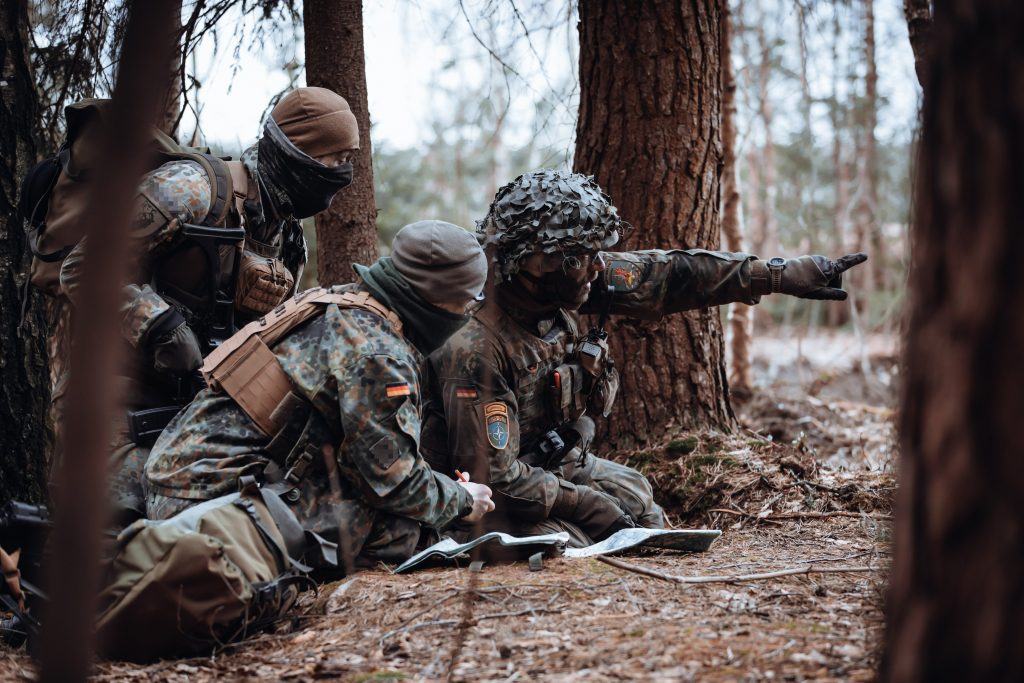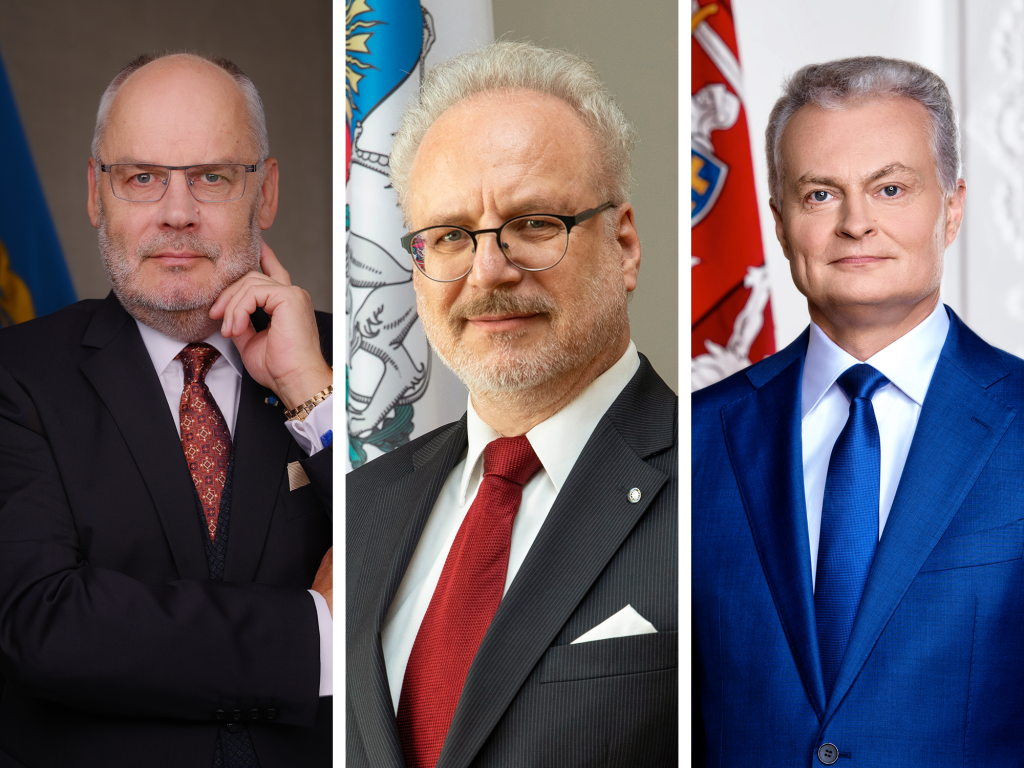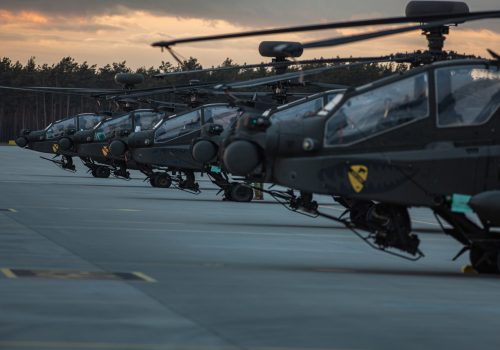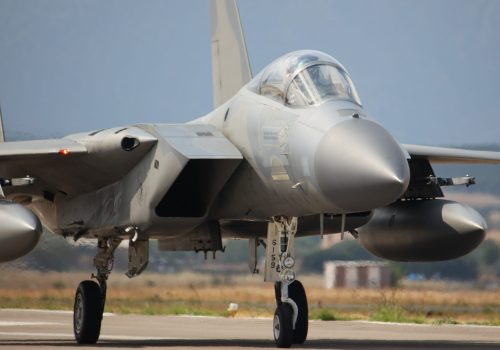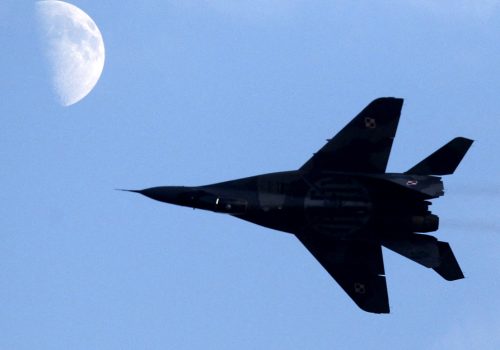Watch the full event
As Russia’s war in Ukraine drags on, it’s time to ramp up Western sanctions even further, draw a red line around the use of chemical weapons by Russian forces, and implement selective no-fly zones around sensitive sites, such as nuclear power plants. That’s according to the presidents of Lithuania, Estonia, and Latvia, who proposed a number of options to counter Russian aggression at an Atlantic Council Front Page event Tuesday.
Read on for some of the key insights offered by Estonian President Alar Karis, Latvian President Egils Levits, and Lithuanian President Gitanas Nauseda, in conversation with Paula Dobriansky, former US under secretary of state for global affairs and vice chair of the Atlantic Council’s Scowcroft Center for Strategy and Security.
Regional resilience
- “On the one hand, we feel secure. On the other hand, of course, we remain vulnerable,” Lithuania’s Nauseda said. Inclusion in NATO—which all three Russia-bordering countries joined in 2004—offers the Baltic region some security, but all three are ramping up military spending and asking for NATO troops in response to Russia’s aggressive actions in Ukraine, as well as its ongoing occupation of parts of Moldova and Georgia. “Only when Moscow sees that NATO is militarily strong, then it is a guarantee of peace in Europe,” Levits said.
- The Latvian president also urged NATO to replace its “tripwire” stance with an approach of “forward defense,” including stationing NATO troops in key locations to be able to beat off, or even counterattack, any infringement of state sovereignty on the Alliance’s eastern flank. One key lesson from Ukraine: The need for anti-aircraft missiles and other air-defense equipment.
- Many Western leaders fear a no-fly zone could lead to a broader global conflict with Russia. But Nauseda suggested that implementing “selective no-fly zones” near very sensitive areas, such as nuclear power plants, could be “credible” yet also “not risk escalation.” His emphasis: “All options are open.”
Not just about troops
- The Baltics’ defense starts with being less reliant on Russian energy. All three leaders cited tapping domestic natural-gas reserves as key to securing energy independence. Karis added that Estonia is continuing to tap shale oil, despite its harm to the environment, and is discussing a nuclear energy plant, even though it would likely take twenty years or more to become operational.
- Nauseda added that Lithuania was more resilient to “energy blackmailing from Russia” than even most Western European nations. “The only risky element is our electricity,” he added, which is still connected to “the former Soviet Union system.” Nauseda said it will take time to connect Lithuania’s grid to Western Europe, and he is hoping to accelerate the country’s original target date of 2025.
- Karis said his government’s approach to television has been key in fighting Russian propaganda in Estonia, where ethnic Russians make up about a fourth of the population. Estonia has increased funding for its own national TV stations, restricted access to Russian-language propaganda outlets, and made some Western TV stations free to the public in recent years. Latvia has engaged in similar media efforts, with Levits citing encouraging poll results suggesting that a large majority of Russian speakers “feel a sense of belonging in Latvian society.”
NATO’s ‘red line’… and even heavier sanctions?
- Levits said NATO members are in agreement that the use of nuclear, chemical, or biological weapons in Ukraine “would change the situation completely” and provoke a “very strong” answer: “I cannot say which kind of answer, because we should not announce this answer in advance so Russia can calculate for that. But… Russia would not be happy with the answer.” Added Nauseda: “It would mean Russia is breaking all the rules that have any relation to civilized war… The price for this action should be huge for Russia: We should use all the measures, including military ones.”
- As the United States, European Union, and other allies discussed further sanctions against Russian supply chains in London on Tuesday, Nauseda said sanctions to date had “only had limited macroeconomic impact” and needed to be strengthened. Among things he said the West should consider: escalating the partial ban against Russia’s participation in the SWIFT international payments system to a full ban and clamping down on sanction “loopholes” via China and other Russia-friendly nations.
Nick Fouriezos is a writer with more than a decade of journalism experience around the globe.
Watch the full event
Further reading
Wed, Mar 9, 2022
Defending every inch of NATO territory: Force posture options for strengthening deterrence in Europe
Issue Brief By
Deterrence in Europe can be enhanced through a range of US and NATO force posture enhancements.
Fri, Mar 18, 2022
A no-fly zone over Ukraine? The case for NATO doing it.
New Atlanticist By Richard D. Hooker, Jr.
The West stands at the crossroads. It's time to act by establishing a no-fly zone over Ukraine.
Fri, Mar 18, 2022
A no-fly zone over Ukraine? The case against NATO doing it.
New Atlanticist By Kelly A. Grieco
Intervening beyond providing weapons to Ukraine's military and food to the Ukrainian population would only make the nightmare worse.
Image: German soldiers from the NATO Enhanced Forward Presence (EFP) multinational battle group conduct exercises in Lithuania in this undated handout photo released by German armed forces on Wednesday March 9, 2022. (Photo by Bundeswehrim/EYEPRESS via Reuters.)
